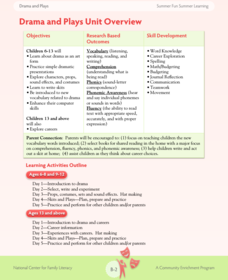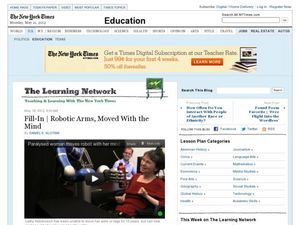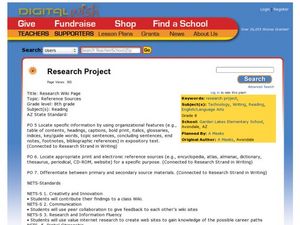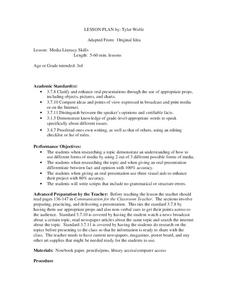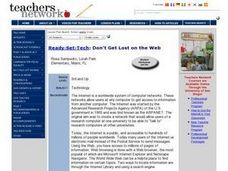Crafty Classroom
Guided Scientific Method
Guide learners through an experiment with a set of worksheets on the scientific method. Six steps prompt your class to ask questions, conduct research, form a hypothesis, test theories, analyze data, and report results.
Read Works
Plymouth Colony
Read about the tumultuous beginning to the United States with an informational text passage about Colonial America. As young researchers peruse an article about the arrival of the Mayflower, the settlers' relationship to the neighboring...
National Center for Families Learning
The Summer Fun Summer Learning Drama and Plays Unit
The play's the thing that puts the play in a summer learning drama program designed to combat summer slide and encourage family literacy. Participants learn about drama as an art form, engage in dramatic presentations, write scripts, and...
Teaching Tolerance
Changing Demographics: What Can We Do to Promote Respect?
America has always been seen as a melting pot to the world. Scholars research the concept of blending cultures in the United States and how it is changing over time. The final lesson of a four-part series analyzes the changing...
Mr. Nussbaum
THE Founding Father
Who is the founding father—George Washington, Thomas Jefferson, or Benjamin Franklin? Scholars decide which of three early Americans, should be crowned the founding father of America based on research. Then, they compose a persuasive...
Serendip
Learning about Genetic Disorders
Each genetic disorder has its own story to tell. A research-based lesson asks individuals to investigate a genetic disorder using scientific web resources. Guiding questions ask them to explain the mode of inheritance and the effects of...
Serendip
How Do Muscles Get the Energy They Need for Athletic Activity?
Every muscle movement requires energy, but where does that energy come from? Scholars answer this question and more as they complete a worksheet. By following the directions, completing research, and discussing it as a class, they begin...
Smithsonian Institution
Native Resistance: Native Resistance Then and Now
Native Americans lost so much—and gained so little in return. Scholars explore Native Americans' resistance to the United States government. The lesson uses primary sources to explore the different forms of protest and gives a voice to...
Teach Engineering
Show Me the Genes
Give your class a chance to show what they know. In the last installment of a seven-part series, pupils summarize and review what they have learned in the series. They present their solutions for creating a biosensor to detect cancer...
Radford University
Buying A Car
What is my monthly payment? Scholars research to find the perfect car for them to buy. Using the cost of the car, they determine a down payment and the amount of monthly payments using a zero interest loan. Finally, they investigate what...
Teaching Tolerance
Community Newsletter
What does it take to develop and publish a newsletter? Young academics create a newsletter with original artwork for their school or community. They explore social justice themes and spread messages of tolerance and inclusion. Scholars...
Curated OER
Use the New Internet Library for Adult Learners
Adult learners, examine the Internet to answer life skills, use an online dictionary, evaluate web sites and fill in online forms. They will also write about web sites in this series of activities.
Curated OER
How to Refine, Narrow, or Broaden a Topic Worksheet
Guide your writers in the pre-writing stage of a research project. Print this sheet to help each writer select an appropriate research topic. They practice narrowing and broadening two different options provided. A natural follow-up...
Curated OER
Boot Camp Fitness Program
Students read a CNNfyi.com article about boot camp workouts and define how it is different than other workouts. They research different workout types.
Curated OER
Brain-Controlled Robotic Arms: Cloze activity with Article
Fascinating content about current medical research on brain-controlled prosthetics comes in cloze activity form with a link to the original article. Useful for listening and reading comprehension skills development, and for any science...
Curated OER
Water 1: Water and Ice
Students discover the forms water can take. In this hands-on science lesson plan, students examine how water can change from a solid to a liquid and then back again.
Curated OER
Words, Words, Words
First graders select an animal that he or she would like to know more about. They generate a series of questions for further study. The class explores sources of information and discusses different types of research.
Curated OER
Do Some Research: Chemistry 7
For this chemistry research worksheet, students read the sentence and research in the library or on the Internet to find the answer and then write it on the blue line. Students then write a short report about this topic: a solid...
Curated OER
Do Some Research: Earth Science 18
In this universe research worksheet, students read the sentence and then use a library or the Internet to find the answer and write it on the blue line. Students then write a short report about this topic: a liquid fuel that forms...
Curated OER
Research Project
Students learn the characteristics of arachnids by researching the arachnid of their choice and producing a 4 to 5 paragraph research paper.
Curated OER
Market Research
Students examine the difference between primary and secondary market research. They discover the limitations on marketing strategies. They explain the importance of having more research done before marketing decisions are made.
Curated OER
Body by Design: Form and Function
Young scholars study symbiosis and its association in nature. For this organisms lesson students divide into groups and research organisms that have a symbiotic relationship.
Curated OER
Media Literacy Skills
You're on camera! Third graders find a news story and research it to get more information. Everyone uses their found information to write a script and create their own news broadcast!
Curated OER
Don't Get Lost on the Web
Scholars discuss purpose of search engines, define World Wide Web, become familiar with website addresses, demonstrate understanding of site updating, create a list of topics about which they would like more information, and visit at...




